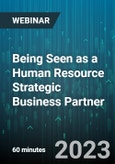In addition, more of the transactional HR work is being outsourced, so HR is not only able to focus more on the strategic side of the business but is also being asked to make a strategic contribution and develop people strategies that clearly add value to bottom-line results. This is the role of the human resources business partner.
A strategic HR business partner works closely with other business leaders influencing strategy, steering its implementation, and making the best use of the organization's people. The HR business partner role is more of a consultative role. Human resource business partners have clients within the organization to whom they provide services and build relationships focused on the vision and objectives of the organization with much less focus on compliance and administration.
Why you should Attend
Research shows considerable agreement between business leaders and HR professionals as to the preferred vision for HR:- business leaders want HR to be making visible, meaningful contributions to the business strategy
- HR professionals want to be managing the organization's HR processes so that they have a significant impact on the success of their organizations
Today's HR business partners need to be:
- internal customer-focused - knowledgeable of their customer's expectations and needs
- strategic - offering services aligned with their customer’s expectations and the business strategy
- change-oriented - continuously improving those HR services for their customers’ benefit
- and technically competent
Making the significant transition from the traditional to the strategic HR role is best accomplished by adhering to an HR Internal Service Improvement Process that involves:
- identifying HR's primary customer(s)
- seeking customer feedback utilizing a SWOT analysis, Internal Customer Report Card, Service Level Agreements, and/or I/P Matrix
- sharing that customer feedback with the employees in the department
- creating a strategic service improvement plan based on that customer feedback
- developing standards of performance for key HR Moments of Truth & processes
- recognizing and rewarding customer-oriented behavior from HR department employees
- and keeping the HR Internal Service Improvement Process 'alive'.
Areas Covered in the Session
- Utilizing a Strategic Frame of Reference to Develop an HR Strategic Plan Supporting Your Organization’s Business Plan
- Strategic Business Partner vs. Traditional Role of HR
- Developing Your HR Frame of Reference
- Drafting Your HR Department’s Mission Statement
- The Challenges and Significance of the Internal Service Provided by You and Your Department
- What is Value to Your Internal Customers?
- The Challenges of Delivering HR Services vs. Producing Products
- What is Value and How Can We Deliver Greater Value to Our Internal Customers?
- The differences between manufacturing and service-providing jobs like HR?
- Creating a 'SWOT' for Your HR Department
- Closing Any HR Service Gaps: a Process to Cause Your Internal Customers to Feel That They are Receiving What They Need & Expect
- Understanding Your Customers’ Expectations
- How Do Your Internal Customers See You? An Internal Customer Report Card
- The Gaps Model of Service Delivery
- Creating Standards of Performance
- Performing to Your Standards of Performance
- Avoiding False Expectations
- Questions Upon Which to Build Your Service Improvement Plan
- Improving HR's Service through an Importance/Performance Matrix
- The Aspects of Your HR Service Most Important to and Valued by Your Internal Customers
- Quality The Most Important Dimensions of HR Service
- A Model for Strategic Leadership
- Drafting Your HR Department’s Vision Statement
- Aligning Your HR Processes with Your Organization’s Business Plan
- Organizational Success Factors - with Samples
- Employee Competencies - with Samples
- Utilizing Talent Management Practices
- Utilizing Your HR Processes to Enhance Employees’ Competencies
- Effectively Carrying Out Your Daily Role as a Coach and Counsellor - to Your HR Team, Managers, and Employees
- When and How to Coach?
- When and How to Counsel?
- Common Coaching and Counseling Opportunities
- Crafting Your Frame of Reference
Speaker
Pete Tosh is Founder of The Focus Group, a management consulting and training firm that assists organizations in sustaining profitable growth through four core disciplines:
Implementing Strategic HR Initiatives: Executive Search, Conducting HR Department Audits, Enhancing Recruiting, Interviewing & Selection Processes, Installing Performance Management Programs, Conducting Training Needs Assessments, Installing HR Metrics, etc.
Maximizing Leadership Effectiveness: Facilitating Team Building Initiatives, Designing and Facilitating 360 Performance Assessments, Executive Coaching, Measuring and Enhancing Employee Engagement and Performance, etc.
Who Should Attend
- HR Professionals New to the Field - seeking a comprehensive view of the subject with multiple initiatives and techniques they can apply immediately
- Experienced HR Professionals - Seeking a Refresher








